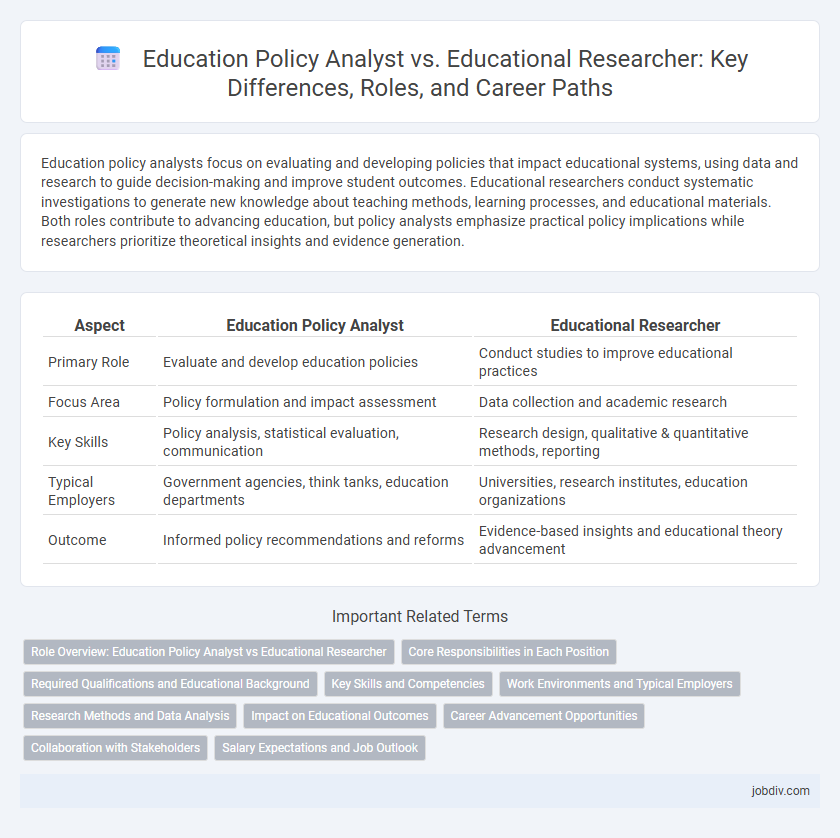Education policy analysts focus on evaluating and developing policies that impact educational systems, using data and research to guide decision-making and improve student outcomes. Educational researchers conduct systematic investigations to generate new knowledge about teaching methods, learning processes, and educational materials. Both roles contribute to advancing education, but policy analysts emphasize practical policy implications while researchers prioritize theoretical insights and evidence generation.
Table of Comparison
| Aspect | Education Policy Analyst | Educational Researcher |
|---|---|---|
| Primary Role | Evaluate and develop education policies | Conduct studies to improve educational practices |
| Focus Area | Policy formulation and impact assessment | Data collection and academic research |
| Key Skills | Policy analysis, statistical evaluation, communication | Research design, qualitative & quantitative methods, reporting |
| Typical Employers | Government agencies, think tanks, education departments | Universities, research institutes, education organizations |
| Outcome | Informed policy recommendations and reforms | Evidence-based insights and educational theory advancement |
Role Overview: Education Policy Analyst vs Educational Researcher
Education Policy Analysts evaluate and develop policies to improve educational systems, focusing on legislative impact, funding allocation, and program effectiveness. Educational Researchers design and conduct empirical studies to generate data on teaching methods, learning outcomes, and educational environments. Both roles require expertise in data analysis and contribute insights to shape educational practice and decision-making.
Core Responsibilities in Each Position
Education Policy Analysts evaluate and interpret educational policies, analyze legislative impacts, and develop recommendations to improve education systems. Educational Researchers design and conduct studies to gather empirical data on teaching methods, learning outcomes, and educational programs. Both roles utilize data analysis but Education Policy Analysts focus on policy formulation, while Educational Researchers emphasize generating evidence-based insights.
Required Qualifications and Educational Background
Education Policy Analysts often require a master's degree or higher in public policy, education administration, or related fields, emphasizing strong analytical skills and knowledge of educational systems. Educational Researchers typically hold advanced degrees, such as a PhD in education, psychology, or social sciences, focusing on research methodologies, data analysis, and experimental design. Both roles demand proficiency in statistical software and a deep understanding of educational theories, but Policy Analysts prioritize policy impact assessment while Researchers concentrate on generating new knowledge and evidence-based practices.
Key Skills and Competencies
Education Policy Analysts excel in data-driven decision-making, policy evaluation, and stakeholder communication, with strong analytical, critical thinking, and report-writing skills. Educational Researchers specialize in designing and conducting empirical studies, statistical analysis, and theoretical framework development, emphasizing methodological rigor and subject-matter expertise. Both roles demand proficiency in data interpretation, research methodologies, and effective dissemination of findings to influence educational improvements.
Work Environments and Typical Employers
Education policy analysts often work in government agencies, think tanks, and advocacy organizations, focusing on policy development and evaluation within public education systems. Educational researchers are commonly employed by universities, research institutes, and private education companies, conducting empirical studies on teaching methods and student outcomes. Both roles require collaboration with stakeholders but differ in setting scope and employer priorities.
Research Methods and Data Analysis
Education policy analysts utilize quantitative and qualitative research methods to evaluate the impact of education policies, focusing on data analysis techniques such as regression analysis, cost-benefit analysis, and policy simulation models. Educational researchers conduct empirical studies using experimental designs, longitudinal data analysis, and mixed methods approaches to generate evidence on teaching practices and learning outcomes. Both roles require proficiency in statistical software and data interpretation to inform decision-making in educational settings.
Impact on Educational Outcomes
Education Policy Analysts evaluate and develop policies to improve school systems, directly influencing resource allocation, equity, and curriculum standards that shape student achievement and graduation rates. Educational Researchers conduct empirical studies to generate evidence on teaching methods, learning processes, and school environments, providing data-driven insights that inform effective practices and intervention strategies. The impact on educational outcomes depends on the integration of policy recommendations with research findings to create scalable and sustainable improvements in student performance and educational quality.
Career Advancement Opportunities
Education Policy Analysts typically advance by influencing public policy through data-driven recommendations and strategic communication, often moving into senior governmental or advocacy roles. Educational Researchers progress by conducting empirical studies that contribute to academic knowledge, frequently securing tenure-track positions or leadership roles in research institutions. Both careers offer pathways to higher impact roles, but Policy Analysts lean towards policy formulation and implementation, while Researchers focus on scholarly contributions and evidence-based educational improvements.
Collaboration with Stakeholders
Education Policy Analysts collaborate with government officials, school administrators, and community leaders to design and implement effective educational policies that address diverse stakeholder needs. Educational Researchers work closely with teachers, students, and academic institutions to conduct studies that inform evidence-based practices and improve learning outcomes. Both roles emphasize stakeholder engagement to ensure policies and research are relevant, practical, and impactful in real-world educational settings.
Salary Expectations and Job Outlook
Education Policy Analysts typically earn median salaries ranging from $60,000 to $90,000 annually, reflecting their role in shaping educational frameworks and government policies. Educational Researchers often have a broader salary spectrum of $50,000 to $85,000, influenced by their focus on academic studies and data-driven insights to improve learning methodologies. Job outlook for both positions is positive, with a projected growth rate of approximately 6% to 8% over the next decade due to increasing demand for evidence-based educational improvements and policy formulation.
Education Policy Analyst vs Educational Researcher Infographic

 jobdiv.com
jobdiv.com